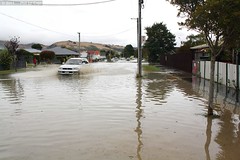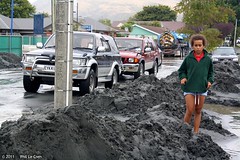
Search
Images for Canterbury Earthquake; more images...
Christchurch, NZ - Cashel Mall Restart
Images, eqnz.chch.2010
The CBD is slowly being opened up and this is the post - earthquake result of Cashel Mall. A vibrant, fresh look with high end shopping in colourful container shops. A really good step forward for the city.
Christchurch, NZ - Cashel Mall Restart
Images, eqnz.chch.2010
The CBD is slowly being opened up and this is the post - earthquake result of Cashel Mall. A vibrant, fresh look with high end shopping in colourful container shops. A really good step forward for the city.
Christchurch, NZ - Cashel Mall Restart
Images, eqnz.chch.2010
The CBD is slowly being opened up and this is the post - earthquake result of Cashel Mall. A vibrant, fresh look with high end shopping in colourful container shops. A really good step forward for the city.
Christchurch, NZ - Cashel Mall Restart
Images, eqnz.chch.2010
The CBD is slowly being opened up and this is the post - earthquake result of Cashel Mall. A vibrant, fresh look with high end shopping in colourful container shops. A really good step forward for the city.
Christchurch, NZ - Cashel Mall Restart
Images, eqnz.chch.2010
The CBD is slowly being opened up and this is the post - earthquake result of Cashel Mall. A vibrant, fresh look with high end shopping in colourful container shops. A really good step forward for the city.
BeckerFraserPhotos April 2011 photograph 482
Images, UC QuakeStudies
A sign on a tent set up in the Arts car park at the University of Canterbury after the 22 February 2011 earthquake. The tents were used as temporary lecture rooms while the buildings were being checked for damage. The sign reads, "Clyde 4, ANTH 102 in E338 Drawing Room Mon 11Am, 155 Seat".
Nisbet, Alistair, 1958- :'Those buildings look pretty ugly!' 10 December 2…
Images, Alexander Turnbull Library
The title reads 'Future Christchurch CBD?...' Two people stare at numerous large featureless blocks across the Avon River. One says 'Those buildings look pretty ugly' and the other points out that they are 'just the piles'. Context: The Christchurch City Council is moving to impose urban-design etiquette and avert architectural mistakes such as clashing with the neighbours, glaring corporate colours and the long, blank walls common to most suburban shopping malls. The proposed rules will be overseen by an urban-design panel of four experts drawn from a pool of 12 architects, designers, planners and valuers. Quantity: 1 digital cartoon(s).
Performance of unreinforced clay brick masonry buildings during the 22nd F…
Research papers, The University of Auckland Library
In the early morning of 4th September 2010 the region of Canterbury, New Zealand, was subjected to a magnitude 7.1 earthquake. The epicentre was located near the town of Darfield, 40 km west of the city of Christchurch. This was the country’s most damaging earthquake since the 1931 Hawke’s Bay earthquake (GeoNet, 2010). Since 4th September 2010 the region has been subjected to thousands of aftershocks, including several more damaging events such as a magnitude 6.3 aftershock on 22nd February 2011. Although of a smaller magnitude, the earthquake on 22nd February produced peak ground accelerations in the Christchurch region three times greater than the 4th September earthquake and in some cases shaking intensities greater than twice the design level (GeoNet, 2011; IPENZ, 2011). While in September 2010 most earthquake shaking damage was limited to unreinforced masonry (URM) buildings, in February all types of buildings sustained damage. Temporary shoring and strengthening techniques applied to buildings following the Darfield earthquake were tested in February 2011. In addition, two large aftershocks occurred on 13th June 2011 (magnitudes 5.7 and 6.2), further damaging many already weakened structures. The damage to unreinforced and retrofitted clay brick masonry buildings in the 4th September 2010 Darfield earthquake has already been reported by Ingham and Griffith (2011) and Dizhur et al. (2010b). A brief review of damage from the 22nd February 2011 earthquake is presented here
Observatory Tower Photograph 08
Images, UC QuakeStudies
A photograph of cracks around a window of the Observatory tower at the Christchurch Arts Centre. The cracks formed as a result of the 4 September 2010 earthquake.
Observatory Tower Photograph 04
Images, UC QuakeStudies
A photograph of cracks around a window of the Observatory tower at the Christchurch Arts Centre. The cracks formed as a result of the 4 September 2010 earthquake.
Observatory Tower Photograph 02
Images, UC QuakeStudies
A photograph of cracks in the masonry of the Observatory tower at the Christchurch Arts Centre. The cracks formed as a result of the 4 September 2010 earthquake.
Observatory Tower Photograph 06
Images, UC QuakeStudies
A photograph of cracks around a window of the Observatory tower at the Christchurch Arts Centre. The cracks formed as a result of the 4 September 2010 earthquake.
Photograph by Neil Macbeth 367
Images, UC QuakeStudies
Wheelbarrows belonging to the Student Volunteer Army stacked up outside the UCSA's "Big Top". The tent was erected to provide support for students at the University of Canterbury in the aftermath of the 22 February 2011 earthquake.
New Zealand Defence Force photograph 277
Images, UC QuakeStudies
Photograph captioned by the New Zealand Defence Force, "The NZ Defence Force helps out after the 22 February 2011 earthquake. HMNZS Canterbury arrives back in Lyttelton Harbour after a very fast return trip to Wellington to resupply".
Cup and Show week gives Christchurch reason to smile
Audio, Radio New Zealand
It's Canterbury's annual Cup and Show week. Organisers say the event has extra prominence this year, as the region's been robbed of many major events because of the damage to venues in the September and February earthquakes.
New Zealand Defence Force photograph 278
Images, UC QuakeStudies
Photograph captioned by the New Zealand Defence Force, "The NZ Defence Force helps out after the 22 February 2011 earthquake. HMNZS Canterbury arrives back in Lyttelton Harbour after a very fast return trip to Wellington to resupply".
New Zealand Defence Force photograph 279
Images, UC QuakeStudies
Photograph captioned by the New Zealand Defence Force, "The NZ Defence Force helps out after the 22 February 2011 earthquake. HMNZS Canterbury arrives back in Lyttelton Harbour after a very fast return trip to Wellington to resupply".
New Zealand Defence Force photograph 528
Images, UC QuakeStudies
Kao Wei, Team Leader of the Taiwan USAR team, hugs Mitchell Brown from the New Zealand USAR National Management Team. The Taiwanese team is heading home after helping out with the emergency response to the Canterbury Earthquake.
Observatory Tower Photograph 38
Images, UC QuakeStudies
A photograph of the earthquake-damaged Observatory tower at the Christchurch Arts Centre. The photograph was taken using a cellphone camera. The top of the tower collapsed during the 22 February 2011 earthquake. The rubble from the tower has been cleared and a tarpaulin has been placed over the top of the broken tower. Tyres have been placed on the tarpaulin to hold it down. A temporary roof has also been constructed over the tower to keep out the rain. Two vehicles are parked in front.
Townsend Telescope: Part Photograph 51
Images, UC QuakeStudies
A photograph of the damage to the teeth of a gear from the worm gear drive of the Townsend Telescope. The gear was damaged during the 22 February 2011 earthquake.
Townsend Telescope: Part Photograph 52
Images, UC QuakeStudies
A photograph of the damage to the teeth of a gear from the worm gear drive of the Townsend Telescope. The gear was damaged during the 22 February 2011 earthquake.
Townsend Telescope: Part Photograph 40
Images, UC QuakeStudies
A photograph of the hour angle setting circle from the Townsend Telescope. The left side of the support arm was bent out of shape during the 22 February 2011 earthquake.
The Effects of a Major Disaster on the Musical Life of a City
Articles, UC QuakeStudies
A paper submitted by Andrew Moore in partial fulfilment of the degree of Bachelor of Music with Honours, covering the effects of the Canterbury earthquakes on the musical life of Christchurch. Dissertation supervised by Dr Elaine Dobson, University of Canterbury School of Music. All photographs from The Press are copyright Fairfax Media and are used with permission.
Photograph by Neil Macbeth 231
Images, UC QuakeStudies
A view down Gloucester Street in the aftermath of the February 2011 earthquake, showing damage to Wave House (formerly the Trade Union building). In the sky above a helicopter can be seen carrying a monsoon bucket that was used to put out flames in the Canterbury Television building.
Photograph by Neil Macbeth 507
Images, UC QuakeStudies
Students at the University of Canterbury relaxing inside the UCSA's "Big Top" tent. The tent was erected to provide support for students in the aftermath of the 22 February 2011 earthquake. The students have spent the day clearing liquefaction from Christchurch properties as part of the Student Volunteer Army.
Evans, Malcolm Paul, 1945-:[Courage in the Christchurch earthquake] 28 Feb…
Images, Alexander Turnbull Library
The cartoon shows a row of gold statuettes of Christchurch Mayor Bob Parker smiling and holding a shovel; these are 'The Bob Awards - for supporting roles in Christchurch'. Context - on 22 February 2011 a 6.3 magnitude earthquake struck in Christchurch, which has probably killed more than 200 people (at this point the number is still not known) and caused very severe damage. The courage, generosity and 'can do' attitude of the people has been wonderful and Bob Parker himself is showing himself a tireless and cheerful mayor in extraordinary circumstances. Colour and black and white versions of this cartoon are available Quantity: 2 digital cartoon(s).
Hubbard, James, 1949- :"You do great work, on behalf of mankind, I express…
Images, Alexander Turnbull Library
Two workmen in hard hats stand amongst the rubble of Christchurch looking askance as the Dalai Lama beams and says 'You do great work, on behalf of mankind, I express great platitude...' One of the workmen holds a newspaper with a heading that reads 'Dalai Lama's quake message: think positive'. Context - The Dalai Lama visited the quake-hit city for two days in early June. He also sent a letter of condolence to Prime Minister John Key after the February 22 earthquake. Quantity: 1 digital cartoon(s).
Parliament pays tribute to victims and rescuers and adjourns
Audio, Radio New Zealand
Parliament has adjourned for two weeks following the declaration of a national emergency after yesterday's devastating Canterbury earthquake. The leadership of the various parties took turns to acknowlege the disaster and pay tribute to it victims and heroes.
Photograph by Neil Macbeth 264
Images, UC QuakeStudies
Groups of emergency personnel conferring at the base of the collapsed Canterbury Television building on Madras Street in the aftermath of the 22 February 2011 earthquake. Behind them, other emergency personnel can be seen searching the ruins for trapped people. Smoke can be seen billowing from the remains of the building.
Photograph by Neil Macbeth 259
Images, UC QuakeStudies
Members of the New Zealand police shifting a wooden beam from the ruins of the collapsed Canterbury Television Building in the aftermath of the 22 February 2011 earthquake. One of the New Zealand Police members has put on a bicycle helmet as protection. Around them, emergency personnel are searching the rubble for trapped people.



